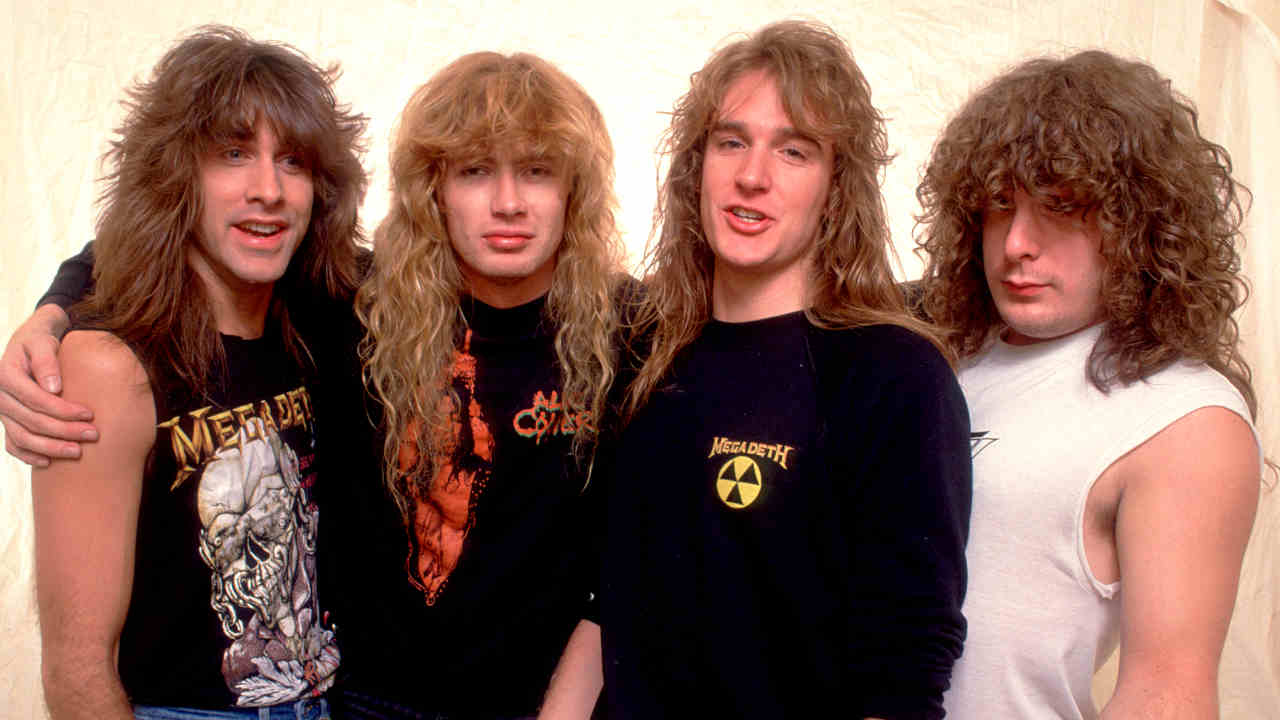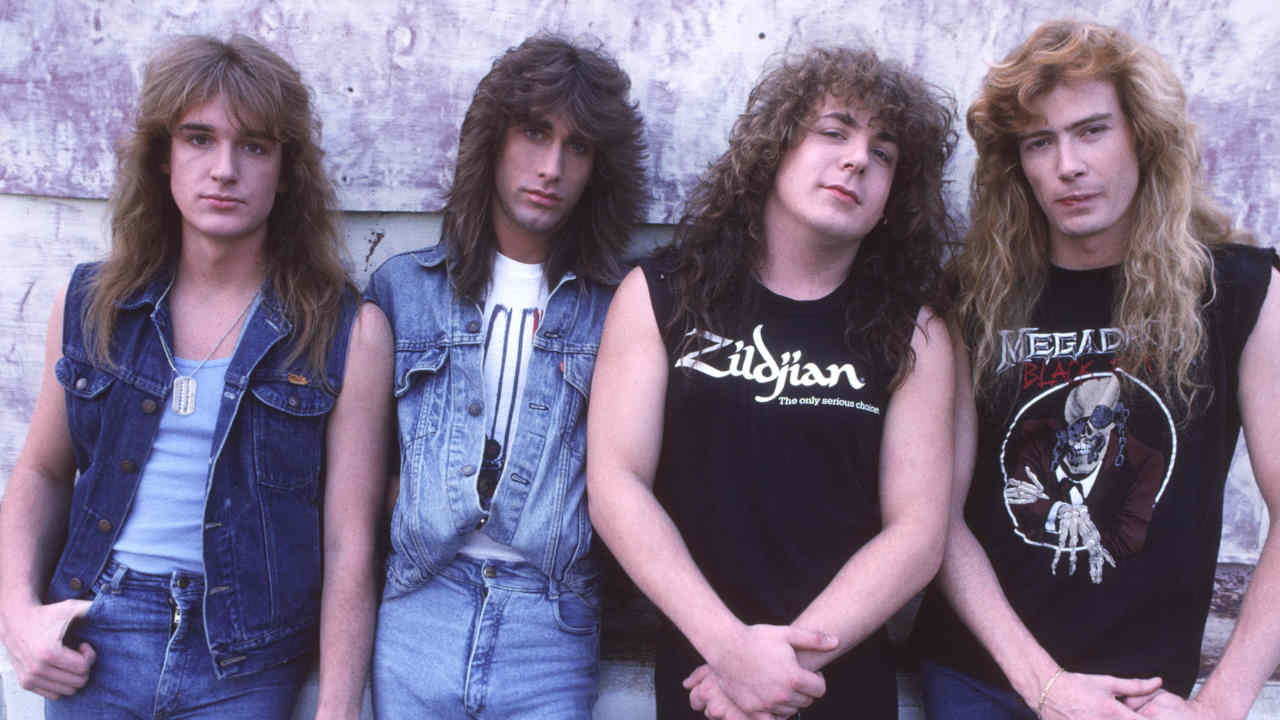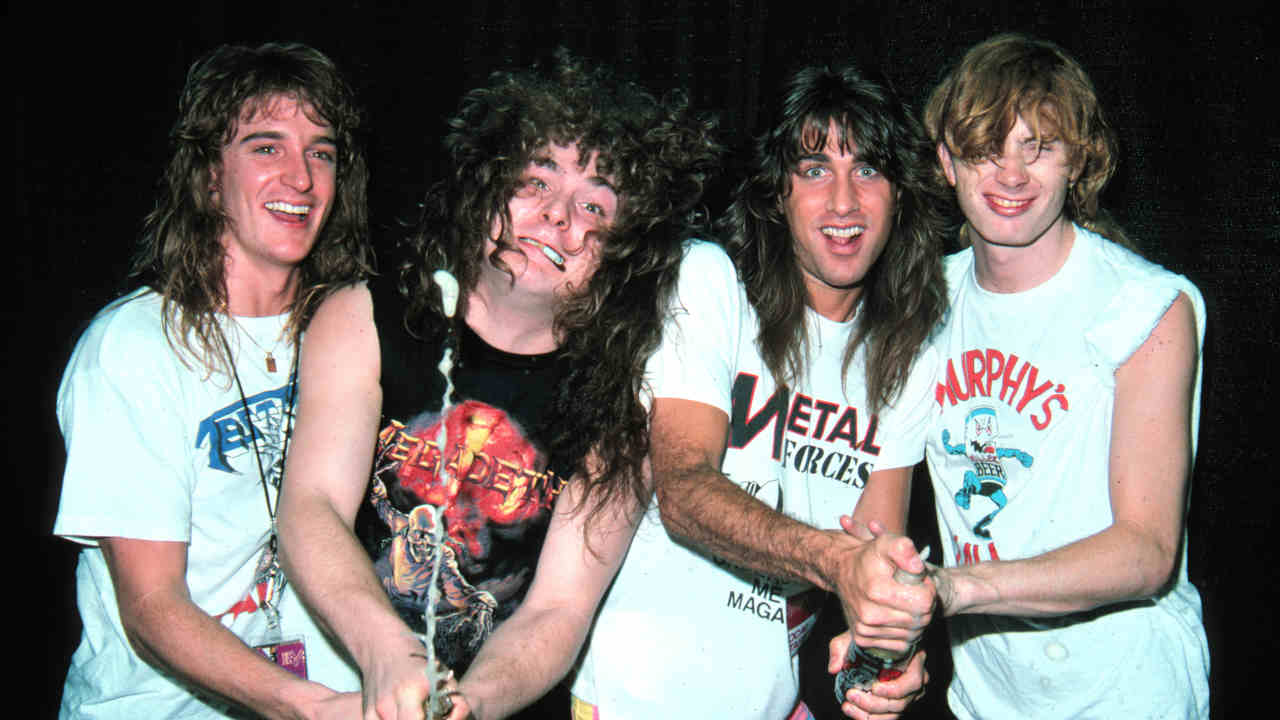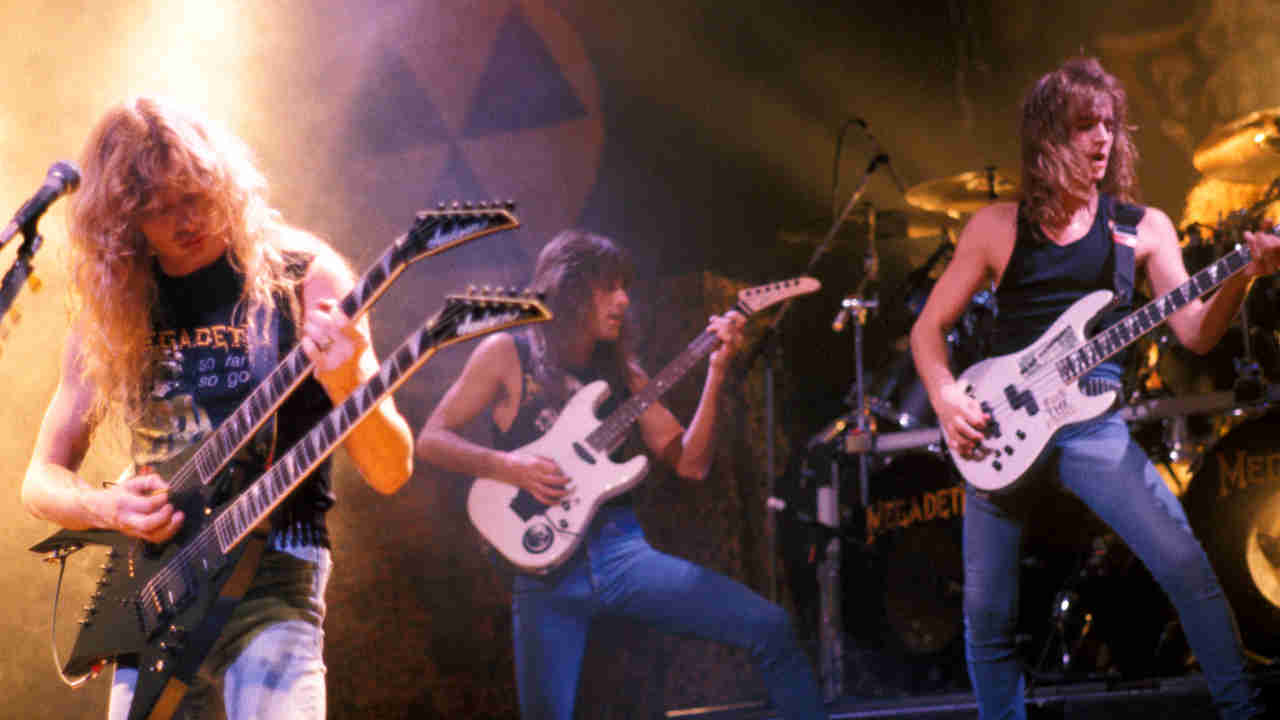
Megadeth were the enfants terrible of the 80s thrash scene, fuelled by booze, drugs and, in the case of mainman Dave Mustaine, a desire for revenge against his former bandmates Metallica. Their first two albums, 1985’s Killing Is My Business… And Business Is Good and 1986’s Peace Sells… But Who’s Buying? were classics of the genre, but by the time of their third album, 1988’s So Far, So Good… So What!, it was all threatening to implode. In 2014, Mustaine and original bassist Dave Ellefson looked back on making thrash metal’s most fucked up album.

At the start of 1988, Megadeth stood on the edge of the precipice, ready to plummet. Since the release of their debut album, Killing Is My Business… And Business Is Good! in 1985, the band had been living on a diet of drugs, booze and anger – and, in the case of mainman Dave Mustaine, a burning sense of injustice.
“I still can’t believe I got kicked out of fucking Metallica,” Mustaine said, at the time Megadeth were recording that first album. “So I drank? Big fucking deal. And the other guys were angels? You know why they got rid of me? James [Hetfield] was jealous. Look at him now, he’s ripped me off, man! And they’re still using my songs. But wait until Megadeth hits – then people will know the truth!”
The success of Killing Is My Business… on the independent Combat label led to the band being snapped up by Capitol for their second album two years later, the classic Peace Sells… But Who’s Buying?. The thrash scene was in full flow, and it seemed Megadeth were second only to Metallica as the predominant force.
Yet by the time Mustaine was ready to record the band’s crucial third album, things were falling apart. Guitarist Chris Poland had left, and drummer Gar Samuelson was fired, leaving only Dave ‘Junior’ Ellefson from the original line-up. And, as recognition came their way, so the pair faced mounting drug problems.
“In the beginning, when me and Junior wanted to intoxicate ourselves, a mix of beer and pot satisfied us,” recalls Mustaine. “But I was fascinated by the fact that I could become a real junkie. I really wanted it to happen. I wasn’t a very interesting guy. I had a problem with everybody. I didn’t notice that I was completely ruining my image. For five whole years I was throwing away $500 a day for fresh material.”
While pursuing a heroin habit seemed to be the aspiration for Mustaine at this point in his life, he also had an album to record and a new line-up to cement. Interestingly enough, Slayer’s Dave Lombardo was the band’s first choice to get behind the kit, but he’s said to have turned the offer down flat because of the band’s ongoing drug addictions. The band instead promoted Samuelson’s drum roadie Chuck Behler, but finding the right guitarist proved to be more of a problem.

“We auditioned this guy Jay Reynolds from an LA band called Malice. But he looked ridiculous – he wasn’t right at all. But he’d been taught by Jeff Young, and we thought that, rather than waste our time with Jay, why not go for Jeff, the organ grinder and not the monkey.”
The new incarnation played their first UK date, headlining the Christmas On Earth Festival in Leeds at the end of 1987 – only their second ever British show full stop – topping a bill that also included Nuclear Assault, Overkill, Kreator and the Cro-Mags. It was an impressive start.
It was an impressive start. And with the line-up now cemented, Mustaine stirred himself into action, determined to make an album that would supersede what had gone before. The trouble was that the band were far from ready. Not only was the leader finding it almost impossible to kick his habits, but he also made a choice of co-producer, Paul Lani, who’d worked with the band on the Peace Sells… sessions. It would be a decision he soon came to regret.
“To all intents and purposes, that album was a fucking disaster,” snarls Mustaine with hindsight. “I was in a confused state about my drugs habit: I wanted to kick it, I didn’t want to kick it, I wanted to kick it, didn’t want to kick it, we were up at Woodstock Studios [upstate New York] and I was sick, and everything was really crazy. And Paul Lani would be out in the woods, peeling apples and coring them and feeding them to the fucking deer while we were trying to make a record. And I’m thinking, ‘You know, deer eat fucking apple skin. They don’t care that it’s peeled and cored!’ We had to remix that album twice and still never ended up with a good mix. Can you believe that? I was paying Lani to go out and feed fucking Bambi, instead of being where he should have been: in there working as hard as possible on the album.”
Things were clearly not conducive to the recording of a quality album at the time, something that Dave Ellefson acknowledges. “Everything about the record was too rushed. We had an unrealistic schedule to meet, and to be honest the line-up of the band just wasn’t right. Neither Chuck nor Jeff really fitted in that well – that’s not to say they aren’t fine musicians, but not for Megadeth. To me, So Far, So Good… was a step backwards for us.”
But in terms of songs, the finished album - full title So Far, So Good… So What! in typically insouciant Megadeth style – actually contains some of the most interesting music the band had recorded. And it nearly contained a song called Megadeth, as the bassist explains.
“Megadeth was a song title that Dave had, and it was the original title of the song Set The World Afire on So Far… We were sitting around one day trying to decide on the name of the band, and someone – I forget who – said, ‘Hey, why don’t we call the band Megadeth?’ That became the name, and we changed the title of that song to Set The World Afire.”
502, meantime, is actually the American police traffic code for driving while under the influence, and was to prove a prophetic song, as Mustaine would be arrested for exactly this in 1989. And Liar was inspired by the mainman’s continuing animosity at the time towards ex-guitarist Chris Poland.
“You know what? He could die tomorrow and it wouldn’t affect me,” Mustaine said at the time. “Chris has never made amends to me for stealing all my gear. I had a collector’s item Echoplex which just disappeared, all sorts of guitars, which were all stolen to cash in for heroin. I’m willing to forgive and forget, but until he comes and makes amends with me then I’m not willing to give in.” (Poland would reunite with his old antagonist to play on 2004’s The System Has Failed but the relationship subsequently soured once again).
Elsewhere, the topical Hook In Mouth was a Mustaine diatribe about censorship in general and the PMRC (Parents Music Resource Center) in particular. The PMRC were an organisation who campaigned in the mid-to-late 80s for stringent laws to be brought in, which would have forced bands to put ‘parental advisory – explicit lyrics’ labels on their records. It was a politically motivated pressure group, with Tipper Gore at the head; her husband, Al, would later become Vice President of the US under Bill Clinton’s tenure.
Perhaps the two most interesting songs are a cover of the Sex Pistols’ Anarchy In The UK (which became Anarchy In The USA) and the emotive In My Darkest Hour. The former featured Pistols guitarist Steve Jones as a guest, even though the session seemed a little perplexing for Mustaine.
“I think the best part about that song was the fact that we did have an original, living, breathing Sex Pistol come in and play on it. Sitting on his guitar case, he came in and he wanted $100 and some ‘suction’ (slang term for… guess what?) and I said, ‘Dude, it’s gonna cost you more than $100 to get ‘suction’ out of us!’ So we gave him a phone book and $1000 and told him to get it himself.”

Mustaine originally wanted to do another Sex Pistols number, Problems, but was talked out of this because it was deemed to be too negative. As a compromise, he then tried to combine the two songs as Anarchy… The Problem Is You, but that didn’t work at all, so the idea was abandoned, and Megadeth decided to stick to Anarchy In The UK. However, it did lead to the amusement of the band mishearing some of the lyrics, which they embarrassingly got wrong on this recording. Instead of the line ‘another council tenancy’, Mustaine sings ‘cunt-like tendencies’. It didn’t impress Sex Pistols singer Johnny Rotten. When Megadeth asked for permission to include the lyrics to Anarchy In The UK on a later Megadeth anthology, he turned the request down flat.
By contrast, In My Darkest Hour was the most personal song Mustaine had wriitten to that point, and in some respects the most difficult. It was penned about his thoughts on hearing about the death of his one-time Metallica bandmate, bassist Cliff Burton, in 1986.
“You know how I found out about Cliff’s death? On the fucking TV!” Mustaine says, still hurt by the whole experience. “Nobody connected with the band could pick up the phone and tell me!” he recalls. “That was just crap.
“You know how I found out about Cliff’s death? On the fucking TV!” Mustaine says. “Nobody connected with the band could pick up the phone and tell me!” he recalls. “That was just crap. “This song was written the day that I found out that Cliff had died. It’s a very moving song for me because it really expresses a lot of the emotion that I was going through. I was really sad and I think the music kind of carries that kind of feeling with it.”
So Far, So Good… So What! was was released in January 1988, reaching number 18 in the UK charts, and number 28 in the US. But the critical reaction was less than ecstatic, with many believing it to be a disappointment following the strength of both its predecessors, largely due to its lacklustre production.
Still, Megadeth were to prove a potent live force, even if their capacity to shoot themselves in the foot was unmatched. In the summer of 1988, on their first headline tour of the UK, the band rolled into Antrim Forum in Northern Ireland and inadvertently prompted a mini-riot.
“I had been enjoying the wonderful adult beverages of Ireland,” recalls Mustaine. “I was overwhelmed about being in Ireland though I didn’t even know the difference between Ireland and Northern Ireland until later on. During the afternoon a guy had been caught selling bootleg T-shirts inside the venue, with the proceeds going to ‘The Cause’. I was told this was a struggle between the Catholics and the Protestants which I thought pretty fucked-up, but I honestly didn’t know that The Cause meant the IRA.”
Mustaine was in an agitated mood onstage that night. He had been struck with a coin thrown from the crowd during the show, and then forced to halt the gig due to a problem with the drums. “I went back and had a shot of peppermint schnapps,” he recalls. “Paul McCartney had famously said: ‘Give Ireland back to the Irish’ and if it was good enough for Sir Paul, well… But when I said those same words followed by: ‘This song is for The Cause – Anarchy In Antrim’ and we played a cover of the Sex Pistols classic things went really fast and I don’t remember everything that happened.”
It wasn’t until Ellefson admonished Mustaine over breakfast that the full enormity of the tale became apparent. “He told me: ‘I bet you don’t remember being escorted out of Antrim last night in a bulletproof bus, do you?’ And no, I didn’t. My reply was: ‘That’s fuckin’ hot!’ but of course it wasn’t fuckin’ hot. Ellefson certainly didn’t think it was cool. Later, when I was alone, I wondered why the fuck I’d done that. But all of us were young, everybody [in the band] was drinking and smoking and we were dealing with a lot of internal personal struggles.”

They escaped unscathed, even using the inspiration as basis for their 1990 single Holy Wars… The Punishment Due. But the chaos wasn’t over. When the band arrived at Castle Donington to play the prestigious Monsters Of Rock festival in August 1988 alongside Gun N’ Roses, Kiss and Iron Maiden, they were in a worse state than ever – Dave Ellefson, in particular, was going through severe withdrawal symptoms, to the point where the band were forced to pull out of the rest of the dates on the tour so they could return to LA where Ellefson and Mustaine could check into rehab.
Few bands could continue at such a chaotic pace, and so it proved with Megadeth. In early 1989, just a year after So Far, So Good… So What! had been released, the band that recorded it fell apart. Tensions between Mustaine and Jeff Young and Chuck Behler resulted in the former firing the latter.
“Chuck was fired because he had some personal problems,” says Mustaine. “He also had a baby very recently. Well, he didn’t, his girlfriend did, although you would never have known from the size of his body! Jeff, on the other hand, was fired because everybody said that he was a pussy fag… well, I just couldn’t take it any more, because it was true. Personally, I hated the motherfucker. He was a bullshit artist; he even tried scamming on my old lady. I mean, he said to her, ‘Yeah, I fantasise about fucking you while I’m fucking my girlfriend’. So, I said, ‘Well I’m gonna fuck you’ – so I fired him!”
Young and Behler were eventually replaced by Marty Friedman and Nick Menza respectively. The new line-up recorded 1990’s acclaimed Rust In Peace, a critical and commercial success. Sandwiched between that album and 1986’s career-making Peace Sells… But Who’s Buying?, So Far, So Good… So What! is often overlooked by all but the most ardent Megadeth fan. And it’s far from flawless, it perfectly captures Megadeth in all their chaotic glory.
Previously published in Metal Hammer Presents The Story Of Thrash, February 2014







